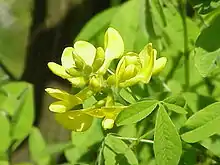Petteria
Petteria ramentacea, commonly known as Dalmatian laburnum, is a species of flowering plant in the family Fabaceae. It is a deciduous shrub native to the western Balkan Peninsula, including Greece, Albania, Bosnia and Herzegovina, and Montenegro.[1][2] It grows up to 3 meters tall, and flowers in May. It grow in shrubland and scrub from 10 to 700 meters elevation, in both sub-Mediterranean and Mediterranean habitats.[2] It belongs to the subfamily Faboideae.[3] It is the only member of the genus Petteria.[4][5][6]
| Petteria | |
|---|---|
 | |
| Petteria ramentacea | |
| Scientific classification | |
| Kingdom: | Plantae |
| Clade: | Tracheophytes |
| Clade: | Angiosperms |
| Clade: | Eudicots |
| Clade: | Rosids |
| Order: | Fabales |
| Family: | Fabaceae |
| Subfamily: | Faboideae |
| Tribe: | Genisteae |
| Genus: | Petteria C.Presl (1845) |
| Species: | P. ramentacea |
| Binomial name | |
| Petteria ramentacea (Sieber) C.Presl (1845) | |
| Synonyms[1] | |
| |
References
- Petteria ramentacea (Sieber) C.Presl. Plants of the World Online. Retrieved 14 September 2023.
- Lerner JM (2001). Anyone Can Landscape!. Ball Pub. p. 100. ISBN 978-1-883052-27-0. Retrieved 8 April 2013.
- "ILDIS LegumeWeb entry for Petteria". International Legume Database & Information Service. Cardiff School of Computer Science & Informatics. Retrieved 15 April 2014.
- USDA; ARS; National Genetic Resources Program. "GRIN species records of Petteria". Germplasm Resources Information Network—(GRIN) [Online Database]. National Germplasm Resources Laboratory, Beltsville, Maryland. Retrieved 15 April 2014.
- "The Plant List entry for Petteria". The Plant List. Royal Botanic Gardens, Kew and the Missouri Botanical Garden. 2013. Retrieved 15 April 2014.
This article is issued from Wikipedia. The text is licensed under Creative Commons - Attribution - Sharealike. Additional terms may apply for the media files.